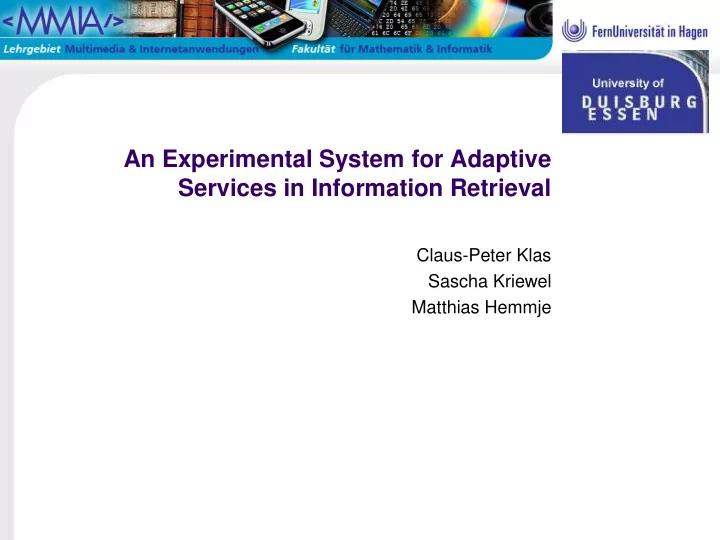

An Experimental System for Adaptive Services in Information Retrieval Claus-Peter Klas Sascha Kriewel Matthias Hemmje
Outline Introduction Adaptivity D AFFODIL Adaptation and Personalisation Scenarios Information Retrieval Adaptive Suggestions
Adaptivity Adaptive system services gather knowledge about the whole computer system, consisting of all running services. The information can be used to optimise processes, enhance quality of service or system security. Focusing just on the data sources, the gathering of knowledge about technical and content aspects, such as access parameters and quality or features of the content, can be used to enhance response time or answer quality. Adaptive content services focus on the transferred information given by user queries and result documents from a semantic viewpoint. Adaptive knowledge gathered by classical IR functionality can be used to enhance the results for the user. Adaptive user services allow for adaptivity and personalisation based on a user model (context). The graphical user interface, the presented information as well as other services can be adapted to individual user or groups.
Drawbacks of DLs & IRS (2000 – today) • In all work-flow phases • Multiple access points • Multiple query forms • Poor functionality (only S&B) • Goals: • One access point • State of the art user interface • Flexible and extensible framework • Raise efficiency and effectiveness of the user
D AFFODIL Framework: User Interface & Services
Adaptive Framework & Concepts Usermodel Personalisation Recommendation Adaptivity Awareness Kollaboration
Statistics/History of D AFFODIL DAFFODIL started in 2000 as national funded project @ University of Dortmund in the IR group of Norbert Fuhr 2 PhDs, more to come, > 14 Master/Bachelor thesis, > 14 Publications in JCDL, ECDL, etc. Lives on unfunded in teaching, projects and as evaluation framework now at Duisburg-Essen and Distance University of Hagen
Adaptive Scenarios Cognitive enhanced model for IR (beginning) Adaptive suggestions (first evaluations)
Cognitive enhanced model of information retrieval Information Information Problem Query deficit need 1. State 2. State 3. State Presented Adjustment Discovery Cognition (concrete) (uncertain) (fuzzy) knowledge Stored Represented Knowledge knowledge knowledge Core IR-engine Cognitive enhanced IR-User interface Human [Lan07]
Dialogue State after initial explorative query k: Recall set
visualised result set Activities Exploration Navigation Focus Inspection Evaluation Store I: Content set J: Interest set R: Relevance set r: Result set k: Recall set
Sequence of separate queries
Challenges The search process is a sequence of activities Information behaviour Similar searches Implicit relevance feedback Further efficiency and effectiveness
Adaptive Scenarios Cognitive enhanced model for IR Adaptive suggestions
Why adaptive suggestions? Users often lack procedural search knowledge DL & IR systems tend to provide many low-level search actions Users rarely able to choose best action to further search Searching often haphazard and unplanned Advanced capabilities and features remain mostly unexploited
Why adaptive suggestions? Provide many tools and possible user actions Users often overwhelmed by possibilities, only a few tools are commonly used Confirmed by several user studies and interviews
Typical problem
Suggestion system for D AFFODIL Observe user situation Finds promising suggestions using case-based reasoning Search situations are cases, suggestions are solutions Suggestions are ranked in reverse order of case similarity Adapts suggestions to current user situation Learns and adapts from successful use of suggestions (user feedback)
Useful strategic advice Gain new query terms by extracting terms from result Visualize co-author relationships for extracted authors Browse proceedings of related conferences Use a thesaurus to find related, broader, narrower query terms Restrict or broaden query based on result terms and result size Vary spelling of a search term (color/colour) … In general: All proposed moves and tactics in work from Bates and Fidel
Reasoning service – finding suggestions Uses Case-Based Reasoning Each search situation is a case, strategic suggestion are solutions Initial case base with iconic cases for each suggestion
Suggestion Tool – adapting and presenting help Availability indicated by unobtrusive button Suggestions resented in ranked list Descriptive title, explanation and score bar Adapted to current situation where possible Execute one or more suggestion and judge them Icons indicate status of suggestion (executable, used, useful)
Evaluation results on adaptive suggestions regarding usefulness Suggestions were found useful (mode and median: 6). 10 out of 12 participants employed new tactics and stratagems. All planned to use these in future searches. Search novices and casual users found suggestions on advanced tools most useful Experienced users liked extraction of terms, authors, . . . From results Might have used tactics on their own, but advice helped them avoid trial-and-error
Summary & Outlook Adaptivity in IR D AFFODIL framework Examples adaptivity Cognitive enhanced IR Adaptive Suggestions Implement cognitive enhanced IR and relevance feedback using all possible event informations
Publications Claus-Peter Klas, Sascha Kriewel, Norbert Fuhr: An Experimental Framework for Interactive Information Retrieval and Digital Libraries Evaluation. DELOS Conference 2007: 147-156 Sascha Kriewel, Norbert Fuhr: Adaptive Search Suggestions for Digital Libraries. ICADL 2007: 220-229 Paul Landwich, Tobias Vogel, Claus-Peter Klas, Matthias Hemmje (2008). Supporting Patent Retrieval in the Context of Innovation-Processes by Means of Information Visualisation. In: Proc. of ECKM 2008
Recommend
More recommend